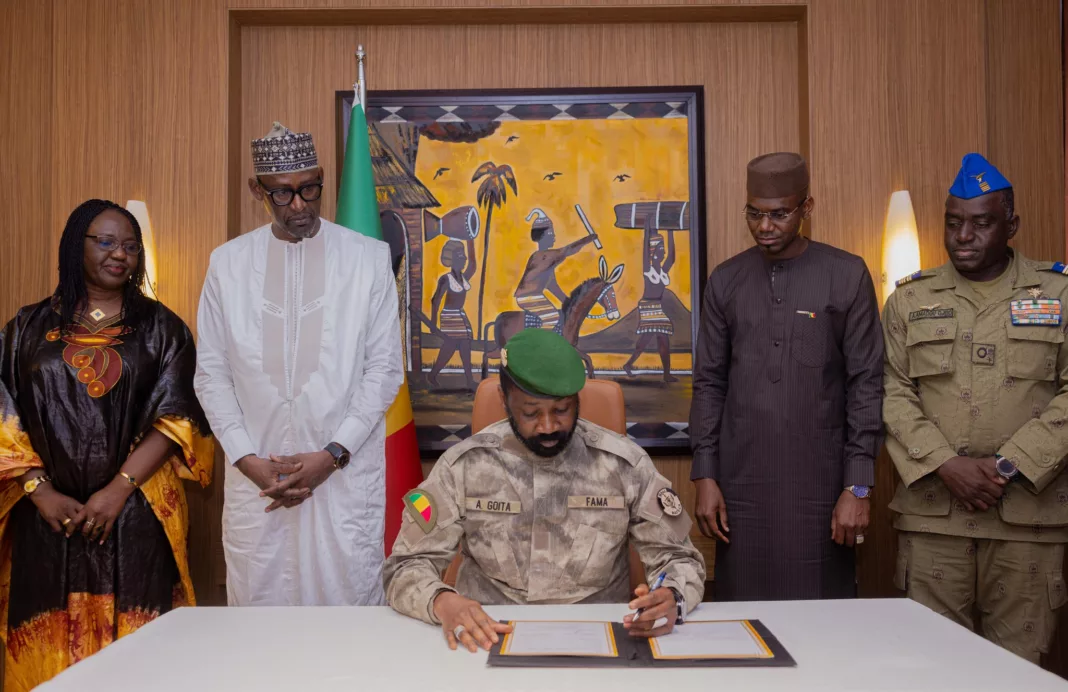The military leaders of Mali, Burkina Faso and Niger signed a charter to establish a defence alliance between them known as the Alliance of Sahel States.
Leaders of the former French colonies Mali, Burkina Faso and Niger on Saturday inked a charter to form a military alliance of Sahel states in defiance to the Western nations after overthrowing the ruling governments and forging closer cooperation amongst the Junta rulers. Mali’s interim president for the transitional period, Assimi Goita, said on X, formerly Twitter, that he had “signed [a charter] with the leaders of Burkina Faso and Niger the Liptako Gourma Charter, establishing the Alliance of Sahel States to create an architecture of collective defence and mutual assistance for the benefit of our people.”
African states, noted Goita, have decided to militarily assist each other, individually or collectively to depose external aggression or internal threats.
The alliance of the three West African leaders, signed on September 16, says that the three states will assist one another in the event of an attack on any one of them.
The alliance document’s Article 6, much like NATO’s Article 5, says that any attack on one or more signatory states will be considered an attack on all signatories. The four-page alliance document, seen by WION, states the “need to continue the heroic struggles waged by the Africa people and countries for political independence, human dignity and economic emancipation”, as defining tenet of the alliance.
“Any attack on the sovereignty and territorial integrity of one or more contracted parties will be considered an aggression against the other parties,” it says.
It also binds the three countries to work to prevent or settle armed rebellions.
The Article 4 of the document underscore combating terrorism in all its forms and organised crime as “common area of the alliance”
“I have today signed with the Heads of State of Burkina Faso and Niger the Liptako-Gourma charter establishing the Alliance of Sahel States, with the aim of establishing a collective defence and mutual assistance framework,” Mali military leader Assimi Goita said on X, formerly known as Twitter.
The alliance announcement succeeds the military pact signed between the three countries in August to allow Mali and Burkina Faso to send troops into Niger’s territory in the event of military aggression against its new rulers.
The development is significant amid growing cooperation between 15-nation ECOWAS (Economic Community of West African States) bloc and the warnings of military intervention that it asserted after military’s takeover of power in Niger in July.
The agreement also calls for the three nations to take joint action against terrorist groups operating in their countries and to secure their borders.
For more than a decade, Africa’s Sahel region — which includes countries such as Mali, Burkina Faso, Niger, and Nigeria — has been infested with jihadist insurgencies contributing in their overall instability.
These jihadist insurgencies are largely perpetrated by terrorist networks linked to the Islamic State and the Al Qaeda.
“This alliance will be a combination of military and economic efforts between the three countries,” Mali’s Defense Minister Abdoulaye Diop told journalists.
“Our priority is the fight against terrorism in the three countries.”
What does it mean for French interests in the region?
The alliance between three West African states, all ruled by military juntas and former French colonies, has been formalised amid souring ties between the three states and France.
All three signatory nations of the newly-formed Alliance of Sahel States were also the members of France-supported G5 Sahel alliance joint force with Chad and Mauritania other two allies. The G5 Sahel alliance, apart from its stated goals related to poverty alleviation, was also aimed to tackle terror groups linked to al-Qaeda and the Islamic State.
The G5 Sahel Alliance, now largely dormant, was launched in 2017 by France, Germany and the European Union.
Niger’s military leaders have unilaterally canceled military agreements under the G5 Sahel Alliance that allowed French forces to fight jihadists in the region, giving the former colonial power only a month to pull out its 1,500 troops. France, however, ignored the ultimatum and demands for its ambassador to leave.
Niger’s leader General Abdourahmane Tiani during alliance’s signing event in Tamako | X/Presidence du Niger
Mali left the G5 Sahel Alliance after a military coup. Even before the military coup in Niger, the democratically-elected President Mohamed Bazoum said in May last year that the force was “dead” following Mali’s departure.
France was forced to withdraw its troops from Mali and Burkina Faso. It remains in a tense standoff with the junta that seized power in Niger after the new military rulers asked it to withdraw its troops and its ambassador.
Mali has also asked the UN peacekeeping mission MINUSMA to leave the country.
Who takes what from the newly forged alliance?
For Niger, the alliance provides a cover of security from the warnings of military intervention from ECOWAS.
But in security terms, Mali is set to gain the most from the alliance in the immediate future.
Mali, in addition to fighting terrorists linked to Al Qaeda and the Islamic State group, has also seen a resumption of hostilities by predominantly Tuareg armed groups over the past few weeks.
The escalation of these armed tensions risks stretching Mali’s army to its limits.
While Mali’s junta claims that it has managed to successfully turn around a dire security situation, independent reports have claimed the quite opposite.
Burkina Faso, under Ibrahim Tarore (34) is expected to lead the newly-formed alliance, due to semblance of stability that the world’s youngest leader has managed to assert in the country, according to Radio Omega.


